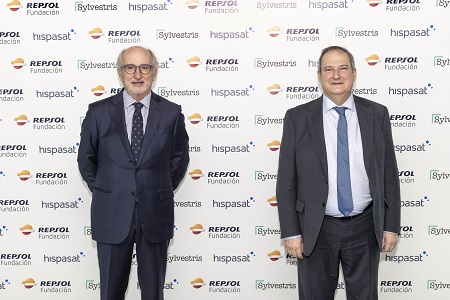The use of satellite technology will help to certify the amount of carbon absorbed by the trees over the years.
 Hispasat, the Spanish satellite telecommunications operator of the Red Eléctrica Group, has signed a strategic partnership agreement with the Repsol Foundation to develop high-end technologies that will be applied to the reforestation sector to offset CO2 emissions.
Hispasat, the Spanish satellite telecommunications operator of the Red Eléctrica Group, has signed a strategic partnership agreement with the Repsol Foundation to develop high-end technologies that will be applied to the reforestation sector to offset CO2 emissions.
The agreement was signed by Jordi Hereu, President of Hispasat, Antonio Brufau, Chairman of Repsol, and Enrique Enciso, CEO of Grupo Sylvestris.
The new technological solutions will be applied to the Repsol Foundations Green Engine project, Spains reforestation programme for offsetting emissions, which envisages reforesting 70,000 hectares of land over the next five to seven years with the capture of 16m tons of CO2.
The use of Hispasats satellite technology in Green Engine will help to develop solutions geared towards controlling forest growth and certifying the amount of carbon absorbed by the trees over the years. To achieve this, the latest technologies for generating satellite data, including high-resolution Earth observation imagery and Internet of Things (IoT) solutions, the sensors of which transmit collected data and big data, blockchain and artificial intelligence via satellite, are used for analysing and processing the data obtained.
Digitalisation is a crucial aspect of Green Engine, essential for undertaking large-scale reforestations that are sustainable over time, as well as for using these new forests to offset CO2 emissions. A firm commitment to consolidating large-scale reforestation as a natural climate solution, being established as a key driver in taking action against climate change and complying with the Paris Agreement.
The agreement also aims to accelerate the Green Engine project, and to do so, it provides for the possibility of extending the project to new markets, as well as applying new formulas for growth in the national territory. Likewise, it encompasses the growth momentum of the voluntary carbon market by applying methodologies that will improve the efficiency of projects that offset emissions through large-scale reforestation.
Jordi Hereu has indicated that satellites are the ideal tool for providing efficient and universal connectivity that ensures accurate control and tracking of these new forests. He said: “We are very proud to participate with the Repsol Foundation and Grupo Sylvestris in an initiative for the sustainable development of our country that is as significant as Green Engine. Green Engine is a project that will allow us to combine satellite applications with a major innovative component that could be deployed at any point under our coverage footprint.”
Antonio Brufau added: “The large-scale reforestation activity that we are already carrying out through the Repsol Foundations Green Engine Project, and which is developed in conjunction with Grupo Sylvestris, required a top-tier technology partner that would help place value on the full potential of the project and of the forested areas as natural carbon sinks. Spain has enormous potential for developing an inclusive, green economy and for protecting biodiversity through new forests, and this agreement converts Green Engine into a point of reference for technological innovation applied to forest engineering for CO2 absorption. Accordingly, the satellite monitoring, tracking and control of forests and their growth require additional state-of-the-art digital technology so that the carbon absorption process is as scientific, accurate and rigorous as possible.”
The Repsol Foundation, together with its partner company Sylvestris, launched Green Engine in 2021, with the aim of promoting reforestation as a tool for offsetting emissions in the framework of the ongoing energy transition.
The agreement reached by Hispasat and the Repsol Foundation falls within the Red Eléctrica Groups Sustainability policy, which promotes a firm commitment to act preventively to preserve and improve the natural environment, minimising the unwanted impacts of the activity and putting special focus on fighting climate change and preserving biodiversity.












































































